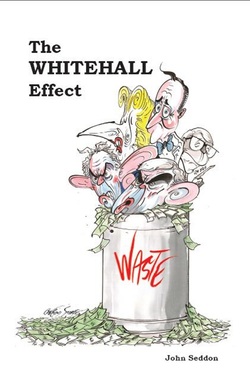The Whitehall Effect ~ John Seddon - Online Notes
|
Links below take you to the chapter notes:
Introduction 1. Prelude Part 1: The industrialisation of public services 2: Call centres 3. Back Offices 4. Shared Services 5. Outsourcing 6. Information Technology Part 2: Delivering services that work Introduction 7. A better philosophy 8. Effective change starts with ‘study’ 9. Better thinking, better design 10. ‘Locality’ working 11. IT as pull, not push Part 3: Things that make your head hurt 12. Targets and standards make performance worse 13. Inspection can’t improve performance 14. Regulation is a disease 15. It’s the system, not the people 16. Incentives always get you less Part 4: ideology, fashions and fads 17. Choice 18. Personal Budgets 19. Commissioning 20. Managing demand 21. Nudge 22. Procurement 23. Risk management 24. Lean 25. IT: features over benefits Part 5 Change must start in Whitehall 26. Beware economists bearing plausible ideas 27. Whitehall is incapable of doing evidence 28. Getting a focus on purpose |
18. Personal Budgets
1 Liz Newbronner et al., 2011, SCIE Report 40: Keeping personal budgets personal: learning from the experiences of older people, people with mental health problems and their carers, Social Care Institute for Excellence. View 2 Brendan O’Donovan, 2010, ‘Systems Thinking in Adult Social Care: how focusing on a customer’s purpose leads to better services for the vulnerable in society and enhances efficiency’ in Keivan Zokaei, John Seddon and Brendan O’Donovan, (eds), 2010, Systems Thinking: From Heresy to Practice, Palgrave Macmillan. 3 The New Economics Foundation (nef) has been at the forefront of the development of ideas of co-production in the UK with this working definition of co-production: “Co-production means delivering public services in an equal and reciprocal relationship between professionals, people using services, their families and their neighbours. Where activities are co-produced in this way, both services and neighbourhoods become far more effective agents of change.” See here, here and the Wikipedia page on the subject here. However, it is hard to know how to translate this definition into something operational, i.e. by what method does one go about creating good co-production in practice? |

